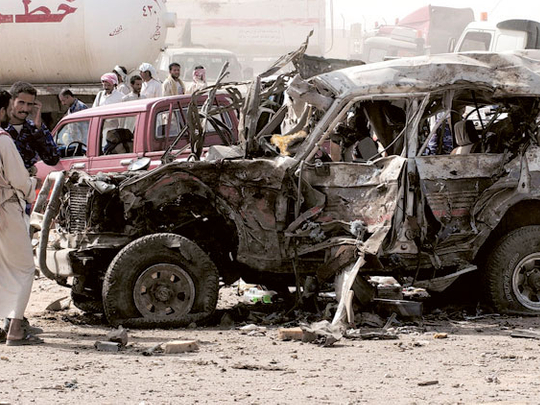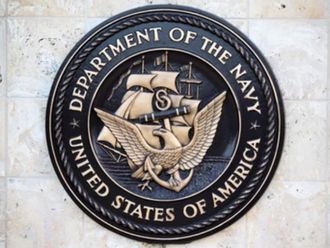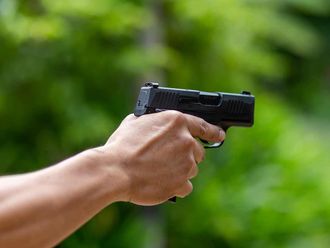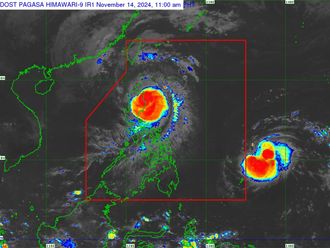
Doha: Nobel Peace Prize-winning Yemeni opposition activist Tawakul Karman has said US drone strikes were ineffective because they were hitting mainly civilians in south Yemen rather than their intended target, Al Qaida-linked terrorists.
The United States and its Gulf allies have watched with mounting alarm as Al Qaida-linked insurgents, emboldened by political upheaval in Yemen, have launched a series of audacious attacks and seized swathes of territory including some major towns.
Washington is trying to counter the threat by stepping up drone strikes to kill suspected terrorists and training the Yemeni army to fight them and stop the country being used as a springboard for attacks on Western targets.
“We are against drone strikes because they will not kill the real Al Qaida, they will only target women and youth,” Tawakul said in an interview in the Qatari capital Doha on Wednesday.
Tribal leaders in parts of Yemen where drone attacks aimed at Al Qaida have killed civilians say the strikes have been turning more and more Yemenis against the Sana’a government and Washington.
Backed by Washington, the Yemeni army has launched a major aerial and ground offensive in south Yemen where terrorists have gone on the rampage in recent months, looting ammunition depots and killing scores of soldiers.
Tawakul said former President Ali Abdullah Saleh, who quit in February after a year of mass protests, was the ‘real hand’ behind the strength of Al Qaida in the Arabian Peninsula state.
“Fighting terrorists is a goal of our revolution, and we welcome the participation of the US and the international community, but the only ones with the interest to combat Al Qaida in our country are the Yemeni people,” Tawakul said. Lack of trust
Saleh long enjoyed Saudi and US backing as their point man in fighting Al Qaida terrorists based in Yemen.
But Saleh’s opponents repeatedly accused him of manipulating the threat of militancy and even encouraging it to scare the United States and Saudi Arabia into backing him as a bulwark against Al Qaida and thereby help him cling to power. “We were uncomfortable with the US approach to combat Al Qaida with Saleh. I told them, ‘You have to be careful with Saleh. Don’t trust him.’ I can’t believe that [the US] didn’t know of Saleh’s connection with Al Qaida,” Tawakul said. “Now with Hadi, we are confident he will stop Al Qaida.”
Tawakul said she was happy with the transition under new President Abd Rabbo Mansour Hadi, who US officials say is proving a more effective partner than Saleh against terrorists.
At least 20 militants and seven soldiers were killed in Yemen on Wednesday when government troops fought off an ambush on the edge of a southern town controlled by an Al Qaida-linked group, an army official said.
Four more Al Qaida terrorists and a soldier were killed on Friday night fighting outside Zinjibar, capital of the southern Abyan province, a military official said on Saturday.
The insurgents had fired three rockets at the headquarters of the 25th Mechanised Brigade, killing the soldier and wounding six others.
Separately, three Al Qaida terrorists were killed and five wounded on Friday when a bomb they were making accidentally exploded in Al Mahfad, a town in northern Abyan, a local official said.
“We are happy and we see progress. That is our victory. He is the president the revolution chose, and we are satisfied. But we are not satisfied with the situation of the army and security forces. Until now, there has been no unification,” Tawakul said.
“It’s very important that the international community [exerts] more pressure. They haven’t done enough. We need support in sacking all of Saleh’s family from the security forces. They support Al Qaida,” she said.
Tawakul said reform activists were focusing on rooting out corruption and restructuring the army and security forces. “But we [protesters] are still in the squares. The tents are still there and we will not leave until we achieve all of our goals,’ she said.
Tawakul won the 2011 Nobel Peace Prize for her role in leading protests against Saleh. She shared the prize with Liberian President Ellen Johnson-Sirleaf and Liberian peace campaigner Leymah Gbowee.












